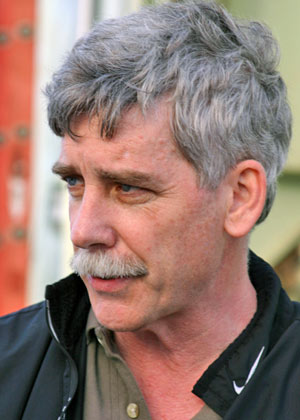Interview: Geochemist William E. Seyfried Jr
 Who inspired Bill Seyfried to pursue a career in geochemistry, great scientists like Marie Curie and Louis Pasteur? No, it was his family and teachers. Learn how Bill designs tools at the University of Minnesota to research chemistry in the oceans, then goes to sea to test them for use at hydrothermal vents. Who inspired Bill Seyfried to pursue a career in geochemistry, great scientists like Marie Curie and Louis Pasteur? No, it was his family and teachers. Learn how Bill designs tools at the University of Minnesota to research chemistry in the oceans, then goes to sea to test them for use at hydrothermal vents.
Where did you grow up, and how did this place influence your interest in ocean science?
I grew up in East Northport, N.Y. with easy access to Long Island Sound and the Atlantic Ocean. Certainly I enjoyed the ocean and had many great experiences sailing, swimming, and fishing.
Did a moment or event occur when you thought “a-ha, I know that I want to be a scientist?”
A single light bulb did not pop on for me. Rather, my interest in science continued to grow during college. Following graduation I had an opportunity to spend the summer at the Woods Hole Oceanographic Institution as a summer student fellow. This involved a cruise to the Indian Ocean on the long-decommissioned research vessel Chain. Working at sea on a daily basis with some great scientists motivated me to attend graduate school.
Who was most influential person in your career, and why?
I think my parents, Ann and Bill Seyfried, and my teachers had the greatest impact on my career. My parents provided the early encouragement and learning environment so critical to the development of a “scientific personality.” Science teachers, including my doctoral thesis advisor, Dr. James Bischoff at the University of Southern California, instilled in me the love of inquiry and the confidence to pursue scientific problems in need of solutions, no matter how difficult they appeared. Also, my wife Carol has been a great support person. She has contributed significantly to my scientific evolution with her encouragement and continual interest in my work.
You mentioned developing a “scientific personality.” In your view, what personality attributes should I think about developing if I am considering becoming a scientist?
I would include perseverance, motivation, and the desire to ask lots of questions about things you don’t understand.
What is your role on this cruise?
My group and I are involved with chemical measurements of hydrothermal vent fluids. An enormously challenging goal is to develop and deploy instruments that observe and monitor vent fluid chemistry over weeks and months, if not longer. Although this research is still in its early stages, we are hopeful that each opportunity to test the new instrumentation at vents will allow progress to be made in the development of better chemical sensors that are used in remote areas of the oceans.
What makes you excited to be a scientist?
I get excited about things we don’t know. You could call this being involved in opportunities for discovery. I especially enjoy figuring out new ways of testing nature.
How do you test nature?
The natural world is complex and often requires that we work on simpler parts. For example, at the University of Minnesota I often try to conceive of imaginative lab-based studies, where we can control variables of water, such as temperature and pressure, and provide new approaches to measure things in the lab and nature. This helps us to bring together the simple parts to form the complex, big picture.
What has been your most fascinating moment in the science discovery process?
I am not sure that I can point to a single moment. My 30-year journey in science has been fulfilling. I have long been fascinated by the complexities of nature and how one event, or part, can influence many others, all of which need exploration to develop an accurate picture of what is really going on. The recent discoveries at deep-sea vents (just about 30 years ago) where the worlds of geology, chemistry, biology and physics came together, not only illustrate the complexities of nature, but the need for interdisciplinary approaches for future discoveries. In other words, we researchers have to act as a team if we are going to answer some of the more challenging scientific questions.
[Back to main interviews page]
|

 Who inspired Bill Seyfried to pursue a career in geochemistry, great scientists like Marie Curie and Louis Pasteur? No, it was his family and teachers. Learn how Bill designs tools at the University of Minnesota to research chemistry in the oceans, then goes to sea to test them for use at hydrothermal vents.
Who inspired Bill Seyfried to pursue a career in geochemistry, great scientists like Marie Curie and Louis Pasteur? No, it was his family and teachers. Learn how Bill designs tools at the University of Minnesota to research chemistry in the oceans, then goes to sea to test them for use at hydrothermal vents.